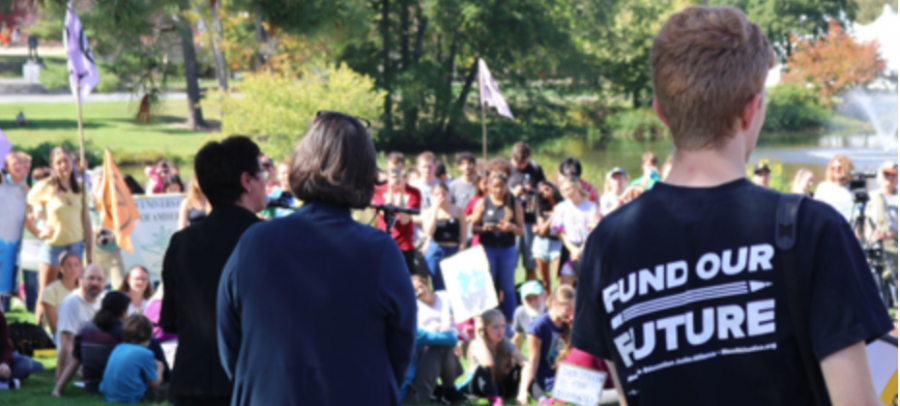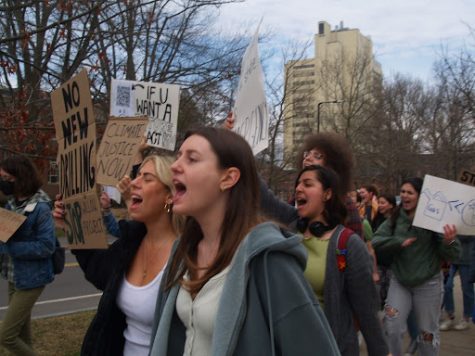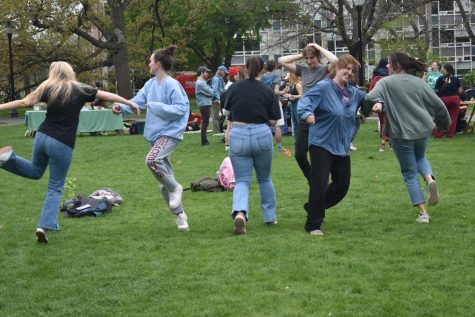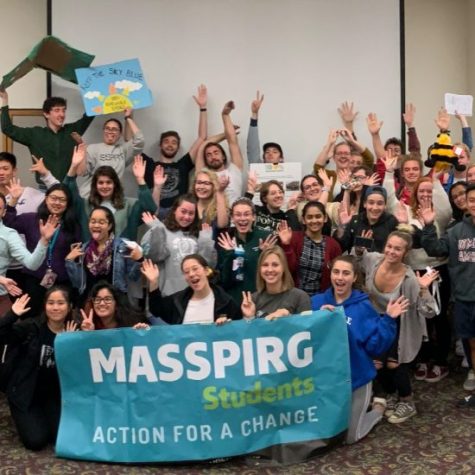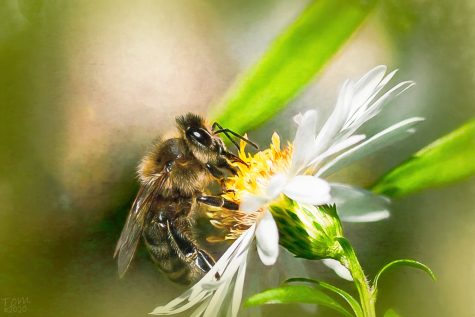“Massachusetts 2050: A Warming State” Where have all the children gone? A reflection on youth absence at the 2019 Climate strike
Baby boomers filled the 2019 climate strike at UMass Amherst, leaving many to wonder what work students are doing to save the planet
Editor’s Note: Amherst Wire is launching a new series, “Massachusetts 2050: A Warming State” to investigate the effects of climate change in our communities and how our state is responding to its imminent impact. The series is targeted to ask specific, in-depth questions on what climate change looks like now and will look like in the future, and the hope there is if a change is instilled amongst the public. This series began production a little over a year ago but was interrupted due to the COVID-19 pandemic and due to this, it contains initial contributions from some of the Amherst Wire alumni.
The following refers to events in 2019 that were scheduled to be apart of the initial 2020 climate series.
“I was doing homework, so no.”
“I had a project due.”
“I went to the one in Boston … just seemed more legit.”
“I had class, wait … no.”
“I didn’t have class. What did we do?”
“I wanted to go and forgot and I felt guilty about it. The whole history department emailed like yeah you should go but I lost track of time and forgot.”
Above is a smattering of reasons why out of 23,515 undergraduates and 7,078 graduate students, MassLive reported only “hundreds” attended the University of Massachusetts Amherst’s climate strike protest on Sept. 20, 2019.
So what is it? Does no one at UMass care? Do young people turn 18 and collectively root themselves in jaded attitudes or is there something more?
The climate strike, in coalition with a global movement attended by four million worldwide, featured singers, activists and speakers like State Representative Mindy Domb and State Senator Jo Comerford. Both elected officials spoke fervently about their anticipated changes for the Pioneer Valley, including an improved bus transit which the U.S Department of Transportation claims “produces 33% less [greenhouse emissions],” and is vital to limiting the impact of global warming.
Comerford pleaded with the crowd that local farmers are in desperate need of help that, she claimed, can only come from willing young people.
“You are the magic that we need to reach across to and hold hands with and bring in this Green New Deal,” beseeched Comerford to the crowd. The Green New Deal would invest in local, green businesses such as the farmers Comerford references.
Yet despite the impassioned pleas from baby boomers, the crowd of UMass students dwindled as speeches continued. Older community members passed off ornate signs, such as a moon split in half divided by the glittering words “Life and Death,” to college students, only to eventually roll them up and take them home after the young people had a nice photo opportunity.
As festivities concluded around 2 P.M., sparse student groups cleared out and three boys lingered by. They chuckled to themselves, “Climate change is over, we fixed it, everybody leave!” and then proceeded to toss a small food wrapper and linger back to their lives.
Across town, this same morning, Xiaoping Yu and Naomi Johnson were two of many on a crowded bus to Boston. Yu and Johnson are high school seniors at Amherst-Pelham Regional High School and are the founders of the Amherst Town chapter of the Sunrise Movement, a national activist organization to combat climate change. The pair had spent the previous evening promoting their cause at the bustling Downtown Amherst Block Party, also attended by hundreds.
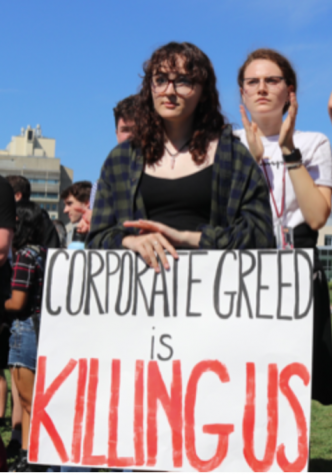
Yu had participated in the March 15th Amherst High School walkout before starting his local chapter. “I didn’t want to just walk out and be done with it,” Yu said, before guiding an older community member through his organization’s goals.
At a small fold-up table outside CVS, in between street dancing and bombastic middle schoolers jeering at anyone who walks by, these high school seniors, Yu and Johnson, attempt to be the magic Comerford craves.
So where are the university students? Perhaps they’re looking for more.
Stellan Vinthagen is a sociology professor at UMass and director of the resistance studies movement. He has participated in over 30 civil disobedience movements and is currently working with Native American tribes.
“I don’t think single actions are very impactful. I think campaigns can be very impactful,” Vinthagen said. Vinthagen highlighted that single actions, protests, exist within the larger structure of a mass escalation campaign. While attendance may be low at one event, Vinthagen notes this is not the most crucial element of campaigning.
If student activists are concerned with numbers, Vinthagen suggests the need for social engagement in these movements. “You won’t get people to come if you’re not having the social relationships,” Vinthagen said. He cited the newness of the UMass Sunrise hub as a factor in minimal turnout.
“Older folks are already involved in the climate justice struggle,” Vinthagen observed. He urges the activists on campus to connect with these boomers, ones who are yearning for a connection.
“Not everyone wants to go to a protest or do something like that. People prefer to do other things and that’s fine,” strike orchestrator Jon Blum said.
Blum, a junior economics major, is the hub coordinator and co-founder of the UMass Sunrise Movement. Blum also serves as the student government representative on Chancellor Subbaswamy’s carbon mitigation task force. Subbaswamy created the task force in November 2018 to “explore mitigation strategies, procurement initiatives and green technologies that can contribute to universities’ long-term sustainability goals,” according to his official statement.
“I was actually a junior in high school then and the day that I came here to do my campus tour was when [the protests at Whitmore occurred.] The school newspaper had ‘30 people arrested at Whitmore’ and that was something that had a sizable impact on me.” According to the Daily Collegian, 34 students total were arrested over three days in April 2016.
The mass escalation campaign that inspired Blum to attend UMass and put pressure on UMass administration to entirely divest from fossil fuels, something Blum says there is no evidence of. The event was organized by Varshini Prakash. Prakash is the co-founder and current executive director of the national Sunrise Movement.
Since Prakash’s graduation from UMass, Blum noticed very little student activism throughout the UMass community. This led him to start the UMass Sunrise Movement hub, focused on climate issues related in particular to the UMass Community such as ending their recently renewed 5-year contract with Coca-Cola, which reportedly used 3 million tons of plastic in 2017 and becoming carbon neutral in the next 10 years. Student protestors at San Francisco State University successfully mounted pressure on their administration to end exclusive pouring rights, the right for one beverage company to control beverage consumption on campus, back in 2015.
“We would not be in this position of having these serious conversations on the administration level if it was not for students voicing this issue,” Blum said. He cites a referendum from March that noted 92% of students supported a transition to renewable energy.
To Blum, rallies are not everything, rallies are not for everyone. Education is everything. He hopes his campaign can spread campus-wide and he is not alone. Blum represents one of many. Currently, the Sunrise Hub alone has 30 dedicated members.
“I think we will send a lot of shockwaves throughout the country and throughout the world that an institution like this, an institution that is a heavy polluter, an institution that has a reputation to uphold can make that transition quite drastically because of the willingness of the students and the willingness of the administration to really think about this issue seriously and really engage with it,” Blum demands.
Even as boys chuckle by the campus pond, mocking the endeavors of a movement steadied to change UMass’ environment, a small group of passionate students gather in Bartlett, in the rooms of South College, on a Friday afternoon across that pond, in a small committee in the Chancellor’s office. As Vinthagen, Comerford and Domb urge, these few individuals are ready to make tidal waves.
Email Julia at [email protected] or follow her on Twitter @juliadonohue3

